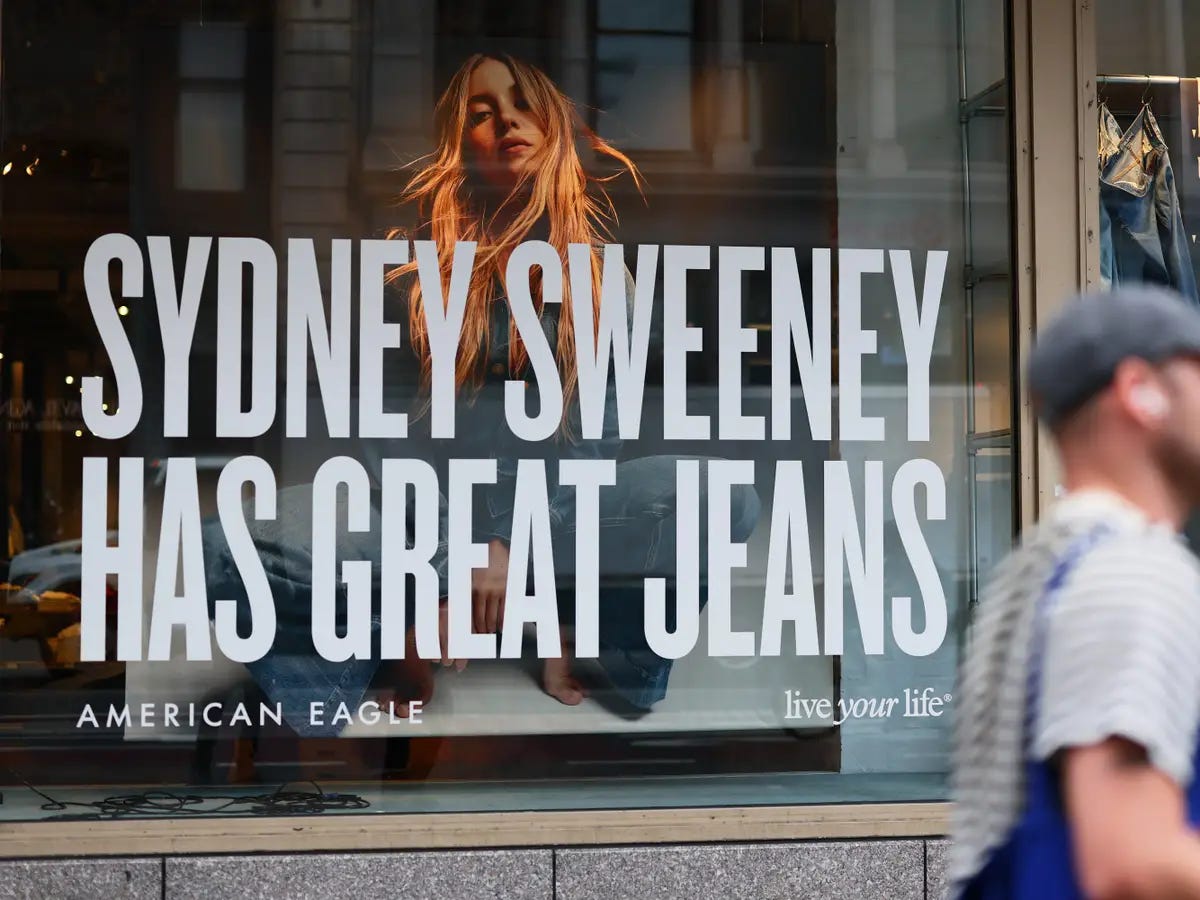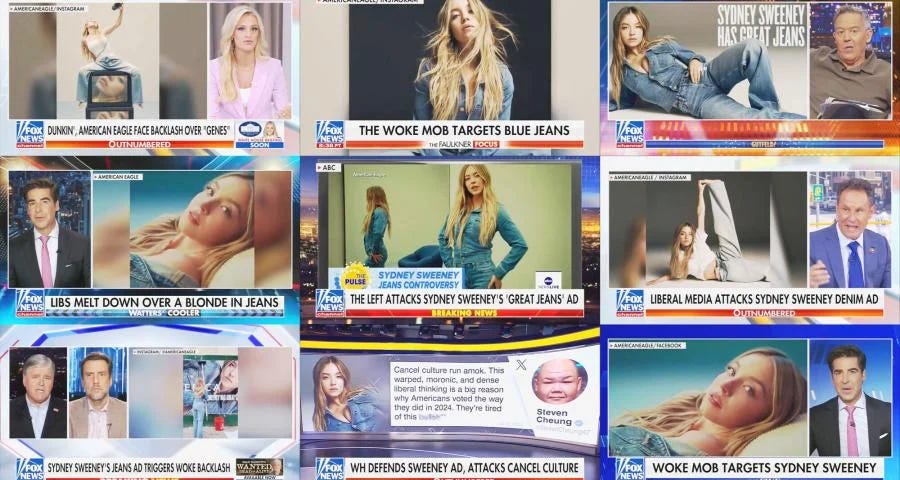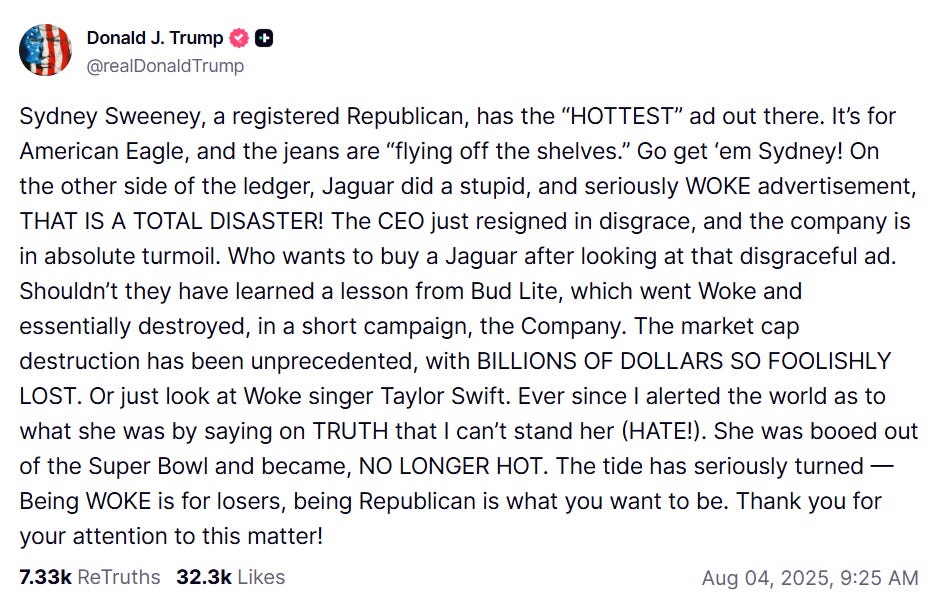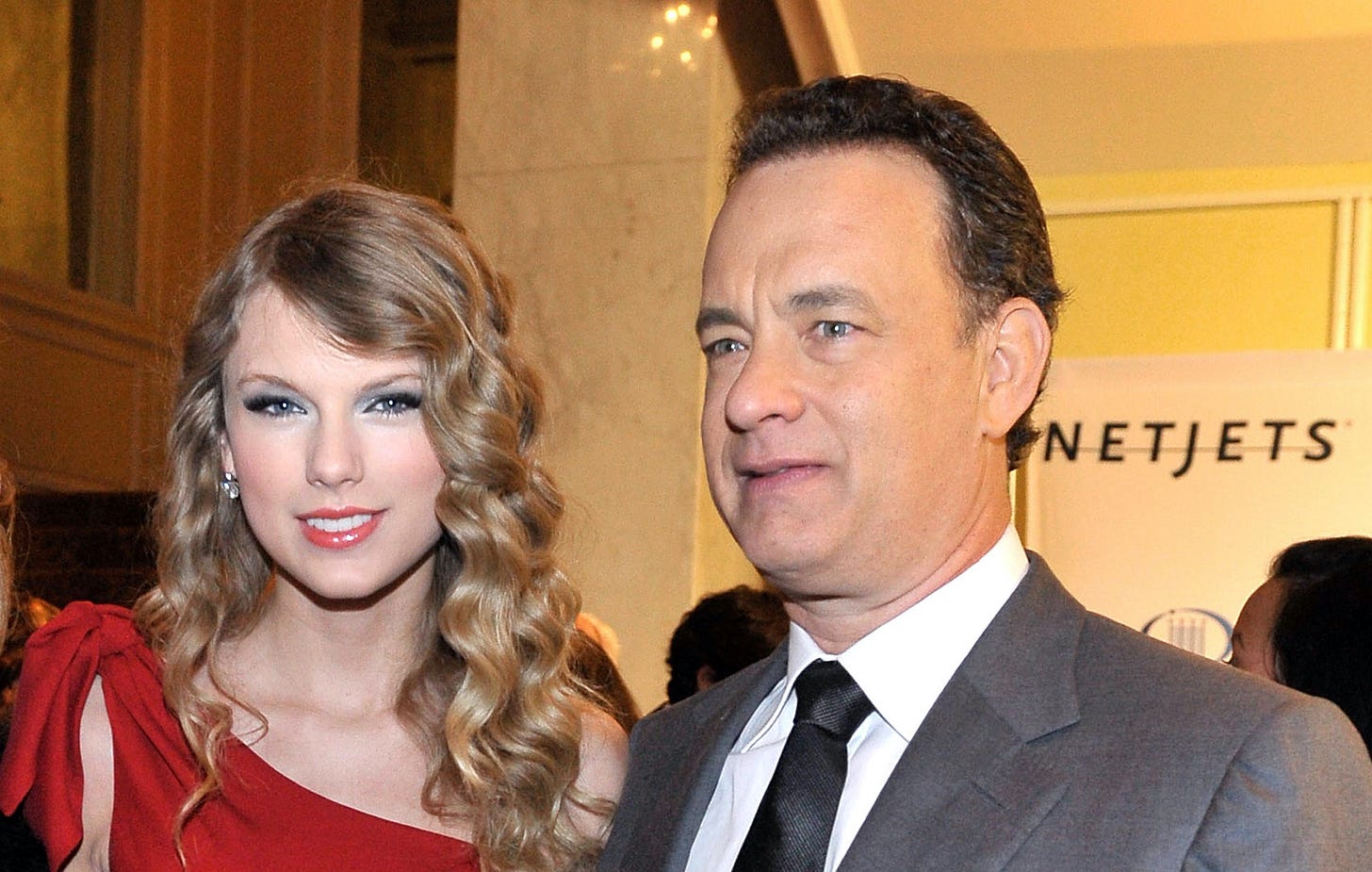Culture Wars Become Corporate Strategy
What these flashpoints tell us about ourselves and our future
A wave of cultural conservatism is washing away the norms that came before.
In 2020, accusations of borderline racism were any organization’s worst nightmare. In 2025, they may be a recipe for success. A recent case study illustrates this cultural shift: the public’s response to a now-famous ad for American Eagle denim.
In the ad campaign, which began on July 23, actress Sydney Sweeney says, "Genes are passed down from parents to offspring, often determining traits like hair color, personality, and even eye color. My jeans are blue." Sweeney is accompanied by the tagline “Sydney Sweeney has great genes jeans.” Is she talking about her genes, or her jeans? Both. It’s a double entendre. One critic wondered whether “a white blonde-haired, blue-eyed woman saying she has ‘good genes’ could be interpreted as a racist dogwhistle.” In 2020, absolutely. In 2025, the verdict wasn’t so clear.
It quickly became a cultural flashpoint. Axios reports: “While the campaign first went viral on social media, it also garnered coverage in roughly 3,000 news articles. Those generated more than 50 million readers.”
According to The New York Times, “Right-wing commentators suggested there was widespread criticism of Ms. Sweeney over her new ad campaign. There wasn’t, at least at first.” The paper’s data analysis found that right-leaning media were on the offensive, picking up the story first and with more frequent coverage. Following this, “the one-sided discourse… appears to have provoked an actual debate: Left-leaning criticism of the campaign rose considerably after the topic gained traction on the right.” Voices on the left swept in to clarify their position on the ad, saying that the ad’s “focus on Sweeney's ‘genes’ is uncomfortably close to a positive portrayal of eugenics.”
Eugenics — the belief that people with characteristics deemed undesirable should be prevented from reproducing — is a racist form of pseudoscience. It is associated with Hitler but was also very prevalent in the US, gripping public imagination, dominating the social sciences, and even shaping legislation for much of the 20th century. Between forced sterilizations and bans on interracial marriage for the sake of “racial purity,” eugenics was still in effect as recently as the 1970s. The notion that genes “determine... personality,” as Sweeney says in the ad, is a particularly glaring anachronism.
In response to the backlash, instead of issuing the expected apology, American Eagle released a statement defending the campaign. “The corporate [communications] script is that you apologize when you offend people,” noted Nathan Miller, a crisis management expert. “Now, they do the cost–benefit analysis and realize if you apologize, it's not going to placate the critics and it will also promote further ire.” American Eagle was taking a calculated risk, and it paid off. No press is bad press, after all. Though some sentiment toward the brand reportedly soured, press coverage and stocks soared, particularly after President Trump shared his support on social media.
The Sweeney ad closely resembles the “genes” wordplay from Brooke Shields’s infamous 1980 ad for Calvin Klein jeans, which was highly criticized for other reasons (at the time, Shields was 15). It’s possible that American Eagle was courting, and even counting on, controversy. American Eagle may have wanted to trip the wire on the outrage machine—to gamify it for its own ends: Views. Attention. Notoriety. If so, it did this expertly; other companies have stumbled into it haphazardly. Take, for example, Cracker Barrel.
Cracker Barrel cracks
On August 19, Cracker Barrel announced a $700 million dollar rebrand. This would include a new logo, without the image of an elderly man sitting by a barrel. The modernization was soon interpreted as expressing shame about American heritage; an affront to people who cherished the South and its traditions. The company’s stock value fell. Once again, President Trump weighed in, posting to social media, “Cracker Barrel should go back to the old logo.” Within days, the company reversed course.
Its website was updated with a 700-word mea culpa announcing that nothing would change in the end. Cracker Barrel assured its patrons that the plan to rebrand was nixed, the “Old Timer” logo was back, and they would be keeping “our heritage at the heart.” Trump responded with praise and well-wishes. “Make lots of money and… make your customers happy again!” Their stock value increased by 8 percent.
These may seem like a pair of disconnected events, but they have a formulaic consistency. American Eagle doubled down in light of conservatives’ support; Cracker Barrel about-faced in light of conservatives’ opposition. Each corporate decision captured public interest and, notably, involved Trump’s input, which may have been just enough to tip the scales. There are much bigger things going on than celebrity commercials and logo changes. But as insignificant as these happenings were, the President of the United States saw fit to chime in. There’s no doubt that Trump’s ambitions extend beyond just policy, to culture.
The tide has turned
Our current cultural environment stands in stark contrast with five or even two years ago. In 2020 and the years that followed, there was an undeniable shift left. DEI became a top priority at companies nationwide. Confederate monuments and statues were taken down. Museums and schools passionately taught the true history of racism. Established brands went to great lengths to avoid offense, such as renaming Aunt Jemima syrup and Uncle Ben’s Ready Rice to steer clear of racial tropes. Apologies abounded. Even in the world of professional sports, the Washington Redskins became the Washington Commanders, and the Cleveland Indians became the Cleveland Guardians. Things were moving in lockstep toward antiracist orthodoxy.
Today, as progressive efforts are being reversed, the opposite is true. Federal DEI initiatives and funding for institutions that embraced DEI are now banned. Monuments are being resurrected to once again honor Confederate figures. Schools’ curricula on racism have been scrubbed. The Smithsonian museums’ materials on slavery are being combed through and potentially scaled back. What’s more, in the case of American Eagle, risking offense is now lucrative and non-apologies are rewarded. Antiracist orthodoxy is no more.
By taking to social media to share a steady stream of AI-generated patriotic art, hostility toward celebrities (Taylor Swift and Tom Hanks), and input on pointless controversies, Trump is intent on taking the whole cultural pie. He won’t win every argument — calls to revert the Washington Commanders and Cleveland Guardians to their former names have yet to be successful, and the Smithsonian issue is still unfolding. But by involving himself in the day-to-day viral moments that many would think beneath the concern of the POTUS, Trump has pulled off a vibe shift: Woke is out. Non-woke is in. “The tide has seriously turned," as Trump declared on social media about American Eagle’s Sweeney campaign.
Another way of looking at Trump’s strategy is to recognize that the cultural and the political are not entirely separate. This has always been true, but Trump is uniquely skilled at collapsing the distinction: leveraging the cultural helps him achieve the political, even as the political feeds into the cultural. In ordering ICE raids, for example, Trump can rely on emotional appeals and trust that the cultural environment he is cultivating will be more receptive to his policies and tactics. (A DHS ad currently running on his Truth Social account invites viewers: “Defend the homeland. Join ICE today.”) Or consider how calling the Defense Department the “Department of War” meshes with ordering military strikes against suspected drug smugglers and deploying federal troops to police US cities.
Looking ahead, we can expect more headlines like the ones about American Eagle and Cracker Barrel. More of the apparently random “why is this even necessary?” controversy. Because these seemingly trivial events are tangible and frequent, they define the frontline of the culture war. Trump will keep joining the fight, making himself the arbiter of patriotism or wokeness, and when he does, we shouldn’t be surprised. As long as empty outrage and frivolous diversion make for a winning strategy, they aren’t going anywhere.










Trump is leading the Right in the KKKulture War.
Who is leading the Left?
We are.
To quote Robert Reich:
“We can no longer wait to be led by those with the power and authority to lead. You must lead, I must lead, all of us must lead. We are the leaders we’ve been waiting for.”
Just one more horrible thing that has eroded civil society thanks to trump and his minions. Every time I see a republican asked to describe DEI, they can’t. They will tell you it’s a terrible “liberal” idea, but that’s all they can say. DEI doesn’t give a job to an unqualified person, it takes being a white male, who OVERWHELMINGLY got hired, off the table in terms of qualifying. Companies don’t hire less qualified people for a position. Republicans can’t grasp this. Not to mention the majority of people who benefit from DEI policies are white women. I feel like the entire country has become a victim of trump and his colossal lack of knowledge in how a country should run to benefit its people. He isn’t even helping his middle base. Unless you’re as racist, homophobic, misogynistic and ignorant as he is, you’re being left behind. I’ve said this a million times, and I will probably say it until the day I die, I blame everyone who voted for him on the embarrassing and disgusting country we have become.